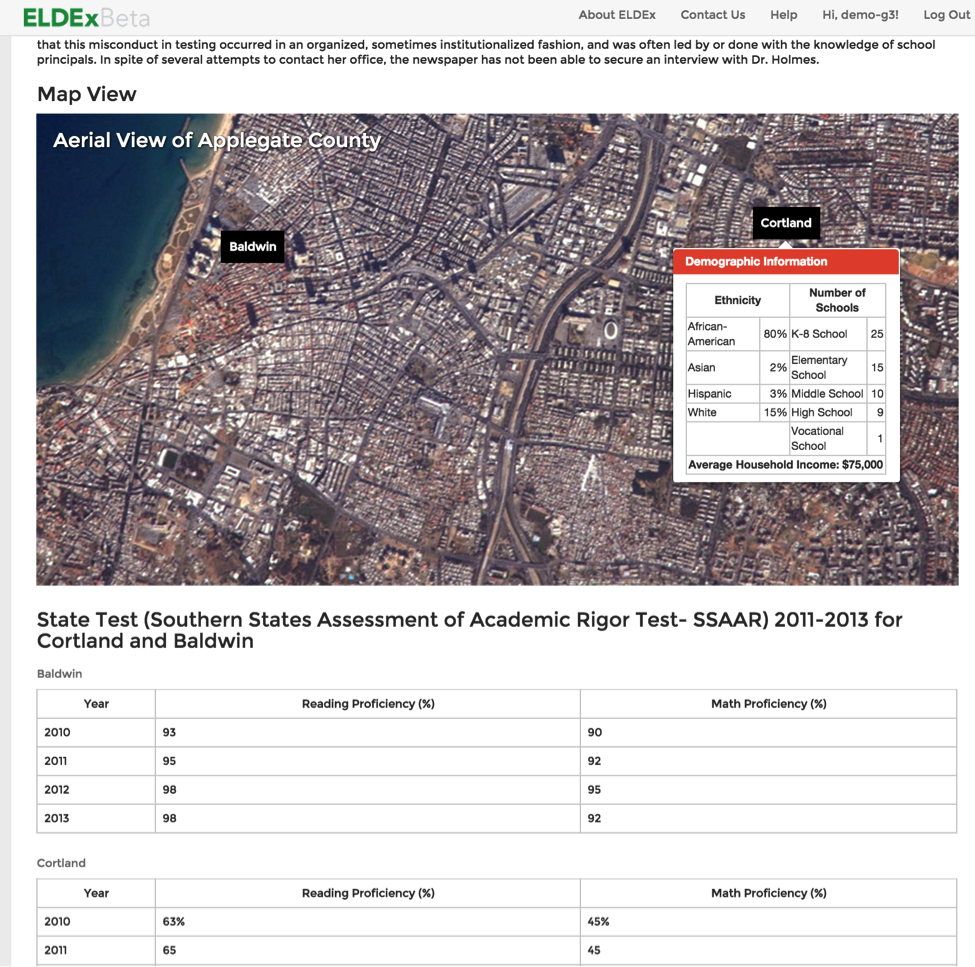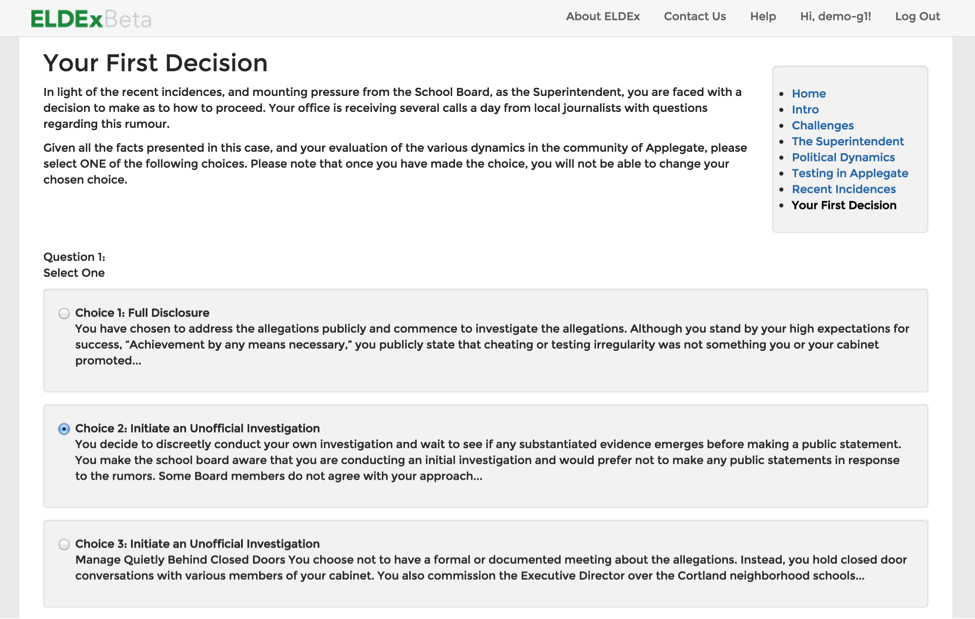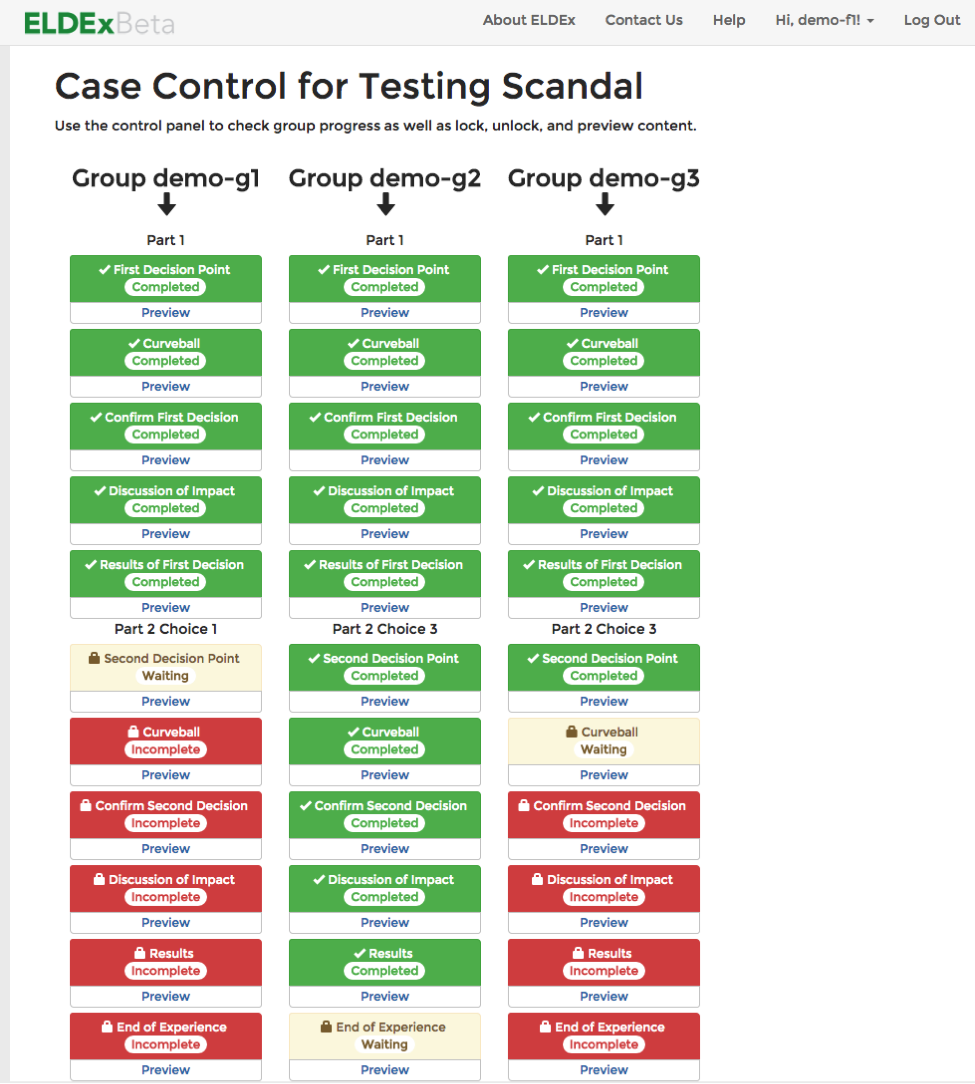A High-Stakes, Decision-Making Experience for Leaders in Urban Education
This month the Urban Education Leaders Collaborative (UELC) at Teachers College, Columbia University and the Columbia Center for New Media Teaching and Learning (CCNMTL) launched the Education Leadership Development Experience (ELDEx). Under the leadership of Zuki Kekana, Assistant Director for the Urban Education Leaders Collaborative (UELC), and Professor Brian Perkins, Director of the Urban Education Leaders Program, the UELC team will begin to use the ELDEx across the country to support professional development for urban education leaders. ELDEx will be used for the first time this summer in New Orleans, LA, NYC, and Charlotte, NC. Stocked with interactive case simulations, ELDEx enhances the UELC experience using interactive decision-making activities based on real leadership challenges and national events in urban schooling.
ELDEx is a custom platform designed by UELC and CCNMTL to enable cohort facilitators to facilitate team progress through a decision-driven experience with simulated outcomes. The development of the tool by CCNMTL was guided by the requirements of the UELC case simulation model. At the heart of this model is the need for participants to work in a group to analyze information, address the circumstances that have brought them to a decision point, draw on prior knowledge, predict outcomes, manage surprises, come to a group consensus on a choice, commit to that choice, and discuss the outcomes in order to provide a report to the larger group.
UELC gathers prospective and current education leaders to discuss contemporary challenges in urban educational leadership. Drawing from effective case approaches used in business schools, ELDEx enhances the UELC cohort discussions and improves learning outcomes by engaging participants in case narratives on relevant topics using the ELDEx as a multimedia learning tool. Participant discussions often involve research-based approaches for leading schools through complex issues, reaching for positive outcomes while trying to avoid negative repercussions. These discussions are anchored in the practical experiences of the participants invited to the cohort. Current case topics include high-stakes standardized testing, teacher contract negotiations, racially influenced bullying, and sexual misconduct in urban schools.
ELDEx gives UELC participants the opportunity to experience high stakes decision-making in groups with the potential of arriving at multiple simulated outcomes based on real events. For each case, the main actor is an education leader with a conflict that needs the consultation of the UELC participants team to resolve. Each UELC cohort has three teams that work independently to discuss assigned case content within the ELDEx system.
Figure 1: ELDEx case narratives include multimedia content, such as an interactive map of the district with test scores for each school.
At the start of the experience, each team is assigned a UELC trained facilitator who guides and facilitates group discussions of the leadership challenge. The facilitator prompts discussion and, based on their observations of the group learning process and the focus of discussions, releases gated content for participants to view. Then, at each decision point in the narrative, the team leader selects from three potential recommendations for how the main actor in the case should respond.
Figure 2: The decision point interface triggers related impact results for the group to discuss based on their choice.
After a choice is registered, and the gated content is released, the system provides custom results based on the team’s recommendation. Results in ELDEx typically include a visual display of key variables designed to indicate the impact the decision had on the main actor’s relationship with key stakeholders such as the school board, the community, and the media.
Each case has nine potential stakeholder outcomes that correlate to choices made by UELC participants at two decision points in the narrative. Throughout the day, UELC facilitators bring the teams together to discuss their progress in the system, as well as the differences in choices and results among the teams. In these directed discussions, UELC participants reflect upon their experience in the ELDEx system as it relates to real-life leadership situations in urban schooling. This reflective learning process encourages aspiring, and current urban education leaders to analyze and dissect causality in a safe environment, thus preparing them to lead effectively when the consequences are actual and imminent.
Figure 4: ULEC facilitators use the case control to lead group users through the case. Each button in the control panel provides a status of gated content in a case (Green is complete; Tan is in progress; and Red is incomplete).
CCNMTL is excited to work with Zuki and Brian to provide ELDEx to education leaders that come from all over the country. Using an interactive instructional tool such as ELDEx, UELC develops urban leaders’ ability to think about complex educational challenges, prepares them to make high stakes decisions, and to lead the way toward developing leadership solutions to the most critical challenges in urban education.






